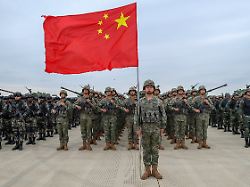Takeover scenarios
This is how China could take down Taiwan
January 10, 2024, 11:07 a.m
Ever since the Russian attack on Ukraine, the question has arisen: is China also planning an attack on its neighbor? Although experts believe a full-scale invasion of Taiwan is unlikely in the near future, various scenarios for an attack are conceivable.
The presidential and legislative elections in Taiwan on Saturday are seen as crucial for the future relationship between Taipei and the increasingly aggressive Beijing and are therefore eagerly awaited internationally. Beijing views Taiwan as a breakaway province that should be reunited with the mainland – if necessary with military force. While experts believe a full-scale invasion is unlikely in the near future, there are some tools that China could use for a possible attack on the island.
“Beheading”: Targeted attacks on military infrastructure
Beijing has recently increasingly flaunted its military strength in the region. China sends fighter jets toward Taiwan every day, while its navy ships maintain a near-constant presence in the waters around the island. China has also held at least two major military exercises in the past year and a half. The aircraft carrier “Shandong” has recently cruised more frequently through the Taiwan Strait, which separates the island from the mainland.
Ou Si-fu of Taiwan’s National Defense and Security Research Institute believes it is likely, based on past maneuvers, that China would use air and missile strikes to target Taiwan’s military infrastructure. Ou calls this the “decapitation” scenario because the bombings would hit Taiwan’s command center, air force, naval bases and ammunition depots. “If you eliminate the political or military minds, you can’t order the troops to defend (Taiwan),” Ou argues.
Blockade and siege
China could also occupy the Taiwanese islands of Kinmen and Matsu, just a few kilometers off the coast of mainland China. Beijing could also try a complete blockade of Taiwan so that no one or anything can get to or from the main island. In April 2023, the Chinese army simulated such a blockade in a three-day exercise after then-US House of Representatives Chairman Kevin McCarthy met with Taiwan’s President Tsai Ing-wen in the US state of California.
Taiwan’s defense ministry warned in a report last year that the Chinese army could block “our ports, airports, military facilities and sea and air communications.” However, analysts say a blockade would have to last a long time to have an effect in Taiwan. In addition, a blockage of the important shipping trade route in the Taiwan Strait could prompt third countries to intervene.
According to the International Crisis Group (ICG), it is unclear how long China could maintain a siege if Taiwan and its allies find a way to bypass the blockade. In addition, such a blockade would cost the global economy at least two trillion dollars, estimates the Rhodium research group.
Amphibious landing
If Chinese leader Xi Jinping fulfills his promise to unite Taiwan with mainland China, his troops would have to occupy the island, argues Ou. To do this, China would have to launch an “amphibious offensive.” However, such operations are complex and difficult, and Taiwan’s mountainous terrain, coupled with the difficult monsoon weather, could be daunting.
However, the island has some vulnerable points: small, so-called red beaches that would be most suitable for a large-scale military landing. One of the beaches near the capital Taipei is in the northern city of Taoyuan, which is also home to Taiwan’s largest international airport. If China’s army seizes the airport, “they can use it to transport their soldiers, their ammunition and their food,” warns Ou.
Amanda Hsiao, an analyst at ICG, believes an amphibious offensive is unlikely in the short term because the risk of failure would be too high. Instead, it assumes that Beijing will continue to increase its pressure on Taiwan. According to Hsiao, there are “daily” indications of this, such as more frequent and closer military activities, the reinforcement of narratives favorable to Chinese interests, and the instrumentalization of trade in the Taiwan Strait.
A large-scale cyber attack
Taiwanese government officials also fear a large-scale Chinese cyberattack. This could paralyze important infrastructure such as communications, electricity and banking.
